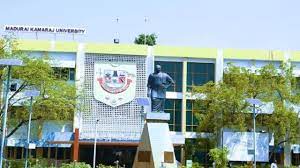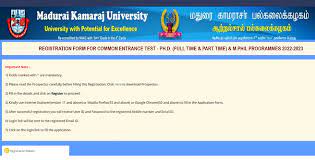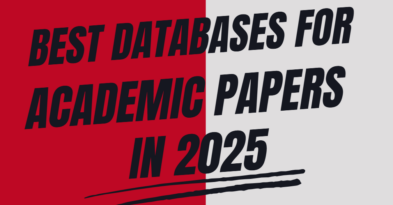MKU to conduct common entrance test for M Phil, PhD
Kenfra Research2023-08-30T12:40:39+05:30MKU to conducted common entrance test for M Phil, PhD
MKU could refer to multiple institutions or organizations. However, one of the most common references is Madurai Kamaraj University (MKU), located in Tamil Nadu, India. If there have been developments since then, I may not be aware of them. MKU refers to Madurai Kamaraj University or any other institution, I am not aware of any specific announcement regarding the conduct of a common entrance test for M Phil and PhD programs. However, it’s important to note that universities and institutions often update their policies and procedures, including admissions processes.

If Madurai Kamaraj University (MKU) is indeed planning to conduct a common entrance test for M Phil and PhD programs, it would be a step towards streamlining the admission process and ensuring a standardized evaluation for candidates applying to these research-oriented programs. This approach is not uncommon, as many universities and institutes in India and around the world conduct common entrance tests for various programs to ensure fairness and efficiency in the admissions process. The most current and accurate information, I recommend visiting Madurai Kamaraj University’s official website or contacting their admissions department directly. They should be able to provide you with the latest information about their entrance exams and admission processes for M Phil and PhD programs.
Steps to conduct the common entrance test for M Phil ,PhD

Conducting a common entrance test for MPhil and PhD programs involves several steps.
1. Planning and Preparation:
- Define Objectives: Clearly state the purpose and objectives of the entrance test, such as assessing candidates’ aptitude, subject knowledge, and research skills.
- Test Committee Formation: Form a committee responsible for designing, organizing, and overseeing the entire testing process.
2. Test Design:
- Syllabus and Topics: Define the syllabus and topics that the test will cover. Ensure it aligns with the academic requirements of the MPhil and PhD programs.
- Question Types: Decide on the types of questions, such as multiple-choice questions, essay questions, or a combination of both.
- Question Creation: Develop a question bank with diverse questions that cover different difficulty levels and subject areas.
3. Test Logistics:
- Test Format: Determine the duration of the test and the number of questions. Allocate appropriate time for each section, if applicable.
- Negative Marking: Decide whether there will be negative marking for incorrect answers.
- Test Centers: Identify suitable test centers based on the number of applicants and their geographical distribution.
4. Registration and Communication:
- Registration Process: Create an online registration portal for candidates to apply for the test. Collect necessary information and documents.
- Admit Cards: Generate and distribute admit cards containing test details, instructions, and candidate information.
5. Test Administration:
- Security Measures: Implement measures to prevent cheating, such as using unique question sets, monitoring with cameras, and employing strict identification procedures.
- Test Day Guidelines: Provide clear instructions to candidates about the test day process, reporting time, required documents, and conduct expectations.
6. Test Evaluation:
- Answer Sheet Collection: Collect answer sheets or digital submissions from candidates after the test.
- Scoring: Develop a standardized scoring rubric and grading system for each question type.
- Moderation: Ensure consistency in scoring by having multiple evaluators review and moderate the answers.
7. Result Declaration:
- Score Compilation: Compile scores for each candidate based on their performance in the test.
- Ranking: If applicable, rank candidates based on their scores to determine eligibility for MPhil and PhD programs.
8. Counseling and Interview (if applicable):
- Shortlisting: If interviews or counseling are part of the admission process, shortlist candidates based on test scores.
- Interviews/Counseling: Conduct interviews or counseling sessions to assess candidates’ research interests, motivation, and fit for the program.
9. Admission Process:
- Offer Letters: Issue official offer letters to successful candidates based on their test scores, interview performance, and other criteria.
- Acceptance and Confirmation: Communicate the acceptance process, deadline, and any required documents for candidates to confirm their admission.
10. Post-Test Communication:
- Feedback: Gather feedback from candidates about their test experience to improve future test administrations.
- Transparency: Ensure transparency by providing candidates with information about the evaluation process and how scores are calculated.
11. Continuous Improvement:
- Review: After the test cycle, evaluate the entire process, identify strengths and weaknesses, and make necessary improvements for the next iteration.
Remember that the steps outlined above may need to be tailored to your specific university’s requirements, policies, and resources. Effective communication with applicants, maintaining fairness and integrity, and providing clear instructions are key factors in successfully conducting a common entrance test for MPhil and PhD programs.








Leave a Reply